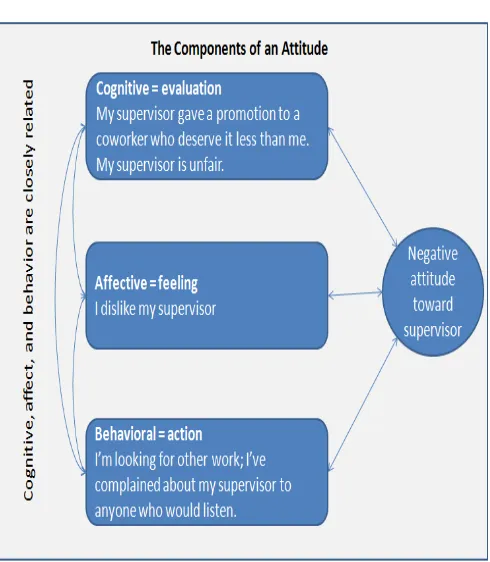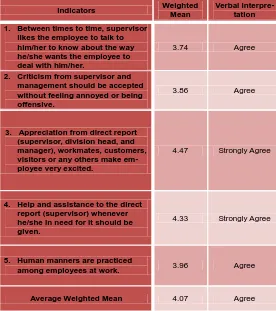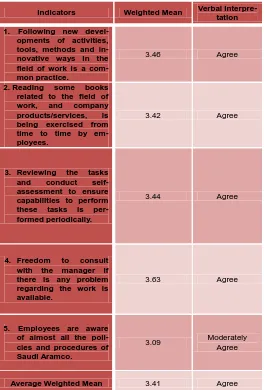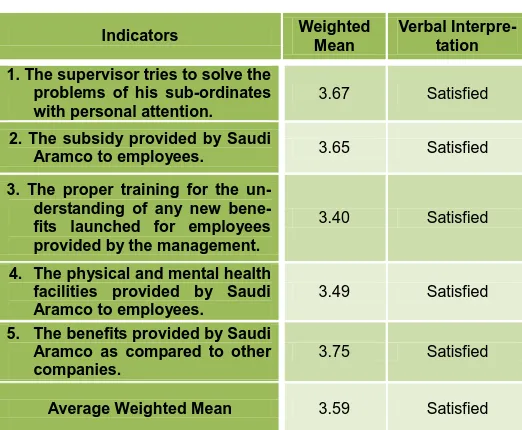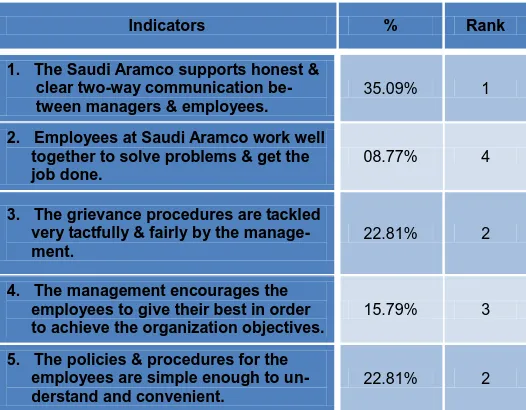Work Attitudes Of Employees Of Saudi Aramco:
Its Relation To Work Satisfaction
Mohammed Yousef Ali Al-Malallah, Andres A. Regondola
MBA, HR-Specialist, Saudi Aramco
Ph.DBM, Assistant Professor, AMA International University -Bahrain
ABSTRACT: This study determined the status and level of satisfaction of work attitudes of employees of Saudi Aramco. The purposes of the hypotheses are tested in the determining the status and level of satisfaction of the manager, supervisors, business & systems analysts and rank in file in terms of personal, initiative and accountability attitudes. There is confusion and debate among practitioners on the topic of employee attitudes and job satisfaction even at a time when employees are increasingly important for organizational success and competitiveness. “Happy employees are productive employees.” “Happy employees are not productive employees.” We hear these conflicting statements made by HR professionals and managers in organizations. This research aims at establishing a level of satisfaction as a basis for employee attitude; whether strongly satisfied, satisfied, moderately satisfied, dissatisfied or strongly dissatisfied. Assessment of the Corporate Business Applications Department of Saudi Aramco in terms of the status and level of work attitudes has shown that the respondents agreed and were satisfied with the status of work attitudes of employees of Saudi Aramco in terms of personal attitudes, initiative attitudes and accountability attitudes. It indicated that there was no significant relationship between the status and the level of satisfaction of work attitudes of employees of Saudi Aramco in terms of personal attitudes, initiative attitudes, and accountability attitudes.
Keywords :Personal Attitudes, Initiative Attitudes, and Accountability Attitudes
1
I
NTRODUCTION“Everyone can bring a horse to the pond, but nobody can force it to drink‟. This Russian proverb is a good definition of work attitudes. Today, it has become a common sense that em-ployees’ work attitudes and level of satisfaction are the key elements in quality of products resulting in company’s high profitability and stability. Every employee has unique collection of values and beliefs, but it is usually based on national and cultural work attitudes that can’t be changed easily and quick-ly. This study aims to to determine the effect of the work tudes of employees of Saudi Aramco in terms of personal atti-tudes, initiatives attiatti-tudes, accountability attiatti-tudes, The Saudi Arabian Oil Company (Saudi Aramco) is the state-owned oil company of the Kingdom of Saudi Arabia. It ranks first among oil companies worldwide in terms of crude oil production and exports, and natural gas liquids (NGL) exports, and is among the leading producers of natural gas. It is also among the world's leading refiners and is moving further downstream into chemicals production.The current work attitudes of employees of Saudi Aramco are based on work ethics, empowerment and motivation. In term of work ethics, employees are introduced to the theoretical understanding only through workshops from time to time. In term of empowerment, employees are trained heavily on technical and managerial depending on the job sta-tus of each employee. However, some employees receive special training of personal and leadership skills. In the other hand, motivation is of a great concerned by the management as it is considered the starter of employee performance. Moti-vation process is based on beliefs, feelings and behaviors. Employees are motivated by either pecuniary or non-pecuniary. But, motivation level is still has not reached the de-sired level of expectation of the management. The work atti-tudes of employees in the workplace that can have a signifi-cant effect on the business as a whole, is presented as the most significant work attitudes with the most effect on em-ployees job performance. Therefore, the work attitudes should be assessed and served as a model to other companies in the Middle East providing the same services. Hence, the study is conducted to examine the factors leading to this success. Robbins and Judge (2011) cited that managers should be in-terested in their employees’ attitudes because attitudes give
warnings of potential problems and influence behavior. Satis-fied and committed employees, for instance, have lower rates of turnover, absenteeism, and withdrawal behaviors. They also perform better on the job. Given that managers want to keep resignations and absences down-especially among their most productive employees-they’ll want to do things that generate positive job attitudes. According to Robbins and Judge (2010), study about the important attitudes reflect fundamental values, self-interest, or identification with individuals or groups that a person values. They both believe that attitudes that individuals consider important tend to show a strong relationship to beha-vior. The more closely the attitude and the behavior are matched or correspond, the stronger the relationship.
entitle “Employee Loyalty Survey”, the survey aims to under-stand the perception and attitudes of Middle East employees pertaining to their career and the organization they work for. Although 17 percent expressed dissatisfaction with their cur-rent jobs, a majority of 53 percent employees (the highest per-centage of all other GCC countries), have agreed that they are satisfied with their jobs. Waleed Alnaqbi (2011) study the sig-nificant difference is found in attitudes towards leadership, where those without a need to supervise seem more in satis-fied agreement than those with supervisory responsibilities. One useful mechanism for understanding commitment beha-viors is to consider them the relationship between the employ-er and employee as one of a fair exchange, with the way in which an employer treats employees having a direct bearing on their performance, attitude and commitment to the organi-zation. Employee attitudes and behaviors, including perfor-mance, reflect their perceptions and expectations, reciprocat-ing the treatment that they receive from the organization. It is important to note that while similarities in attitudes towards work and management practices exist across Middle Eastern countries, there are also considerable variations between countries in the Middle East that cannot be explained by cul-tural factors. Amna & Fatma (2010), cited that job satisfaction means the degree of positive emotions the employees has toward a job (Abu Elanain, 2009). So if the employees are satisfied with what they got, their reaction will be positive and they will perform better toward their job. “Attitude to the job can contribute to job satisfaction, because job satisfaction is a general attitude that comprises several attitudes related to various fields (Uygulama, 2009).” As a conducted research has shown that when employees is being treated unfairly by his organization they respond both affectively with lower com-mitment and behaviorally with increased turnover, theft and decreased citizenship behavior (Abu Elanain, 2009). The study conducted that justice plays a big role in influencing em-ployee’s satisfaction and performance. Employees need to be satisfied not only with justice but also with a successful rela-tions with the management, relarela-tions with employees, job safety, being recognized, pay and promotion, unambiguity of roles, freedom, performance and life satisfaction and trade unions. Hossam M. Abu Elanain (2010), stated that the work attitudes and behaviors investigated in this study included job satisfaction, organizational commitment, and turnover inten-tions. The key conceptual difference between satisfaction, commitment, and turnover is that the first two concepts are employees’ attitudes but turnover refers to an employees’ be-havior. Job satisfaction is perhaps the most widely studied work attitudes over the last four decades of organizational stu-dies. Researchers have defined and measured satisfaction both as a global construct and as a concept with different mensions. This study used the global approach over the di-mensions approach, conceptualizing job satisfaction as the degree of positive emotions an employee has toward a job.After reviewing the previous literature and studies, some of similarities are as follows: firstly, subject to assess the work attitudes of employees and recommendations to improve the work attitudes, secondly, most of the literature and studies were focused on the modern practices which may help assess the work attitudes in order to improve it. Thirdly, they focused to improve the work attitudes to enrich the employees with the tools and skills to improve their productivity.
Theoretical Framework
Figure 1: Theoretical Framework of the Study.
METHODOLOGY
The study utilized the descriptive ــ evaluative type of research. An organizationally - based, descriptive portion of design was pursued through the use of relevant data via conducting ques-tionnaire. The articulated research outline happened to be the most fitting one exemplifying the work attitudes of employees of Saudi Aramco. According to James P. Key (1997), Descrip-tive research is used to obtain information concerning the cur-rent status of the phenomena to describe "what exists" with respect to variables or conditions in a situation. The methods involved range from the survey which describes the status quo, the correlation study which investigates the relationship between variables, to developmental studies which seek to determine changes over time.The respondents were selected as the employees of Corporate Business Applications Depart-ment of Saudi Aramco. The total sample of the study is 330 respondents with 1 manager, 40 supervisors, 219 busi-ness/systems analysts, and 70 ranks in file. The population of each class will be shown in Table 3.1. The Table shows that 0.30% manager, 12.12% supervisors, 66.36% busi-ness/systems analysts, and 21.21% rank in file responded to survey.
Table 1-Respondents Classification
Respondents Frequency Percentage
Managers 1 0.30%
Supervisors 40 12.12%
Business/Systems Analyst 219 66.36%
Rank in File 70 21.21%
Total 330 100%
* The conducted respondents were selected on selective basis.
In this study, the sampling consisted of only two groups; these groups included management employees and regular em-ployees of the Corporate Business Applications Department (CBAD) of Saudi Aramco. Purposive sampling was used in the study where the researcher identified criteria for the selection of the respondents. This often improved the reprehensive of sample by reducing sampling error. The t-test was used to determine the significant relationship between the status and the level of satisfaction in terms of work attitudes of employees of Saudi Aramco.
Findings and Discussion
This chapter presents the finding, analysis, interpretation and discussion on the status and level of satisfaction of work atti-tudes of employees of Saudi Aramco.In this section, the status as well as the level of satisfaction of work attitudes of em-ployees of Saudi Aramco for the following variables namely: personal attitudes, initiative attitudes and accountability atti-tudes of employees of Saudi Aramco will be discussed.The data gathered and generated from respondents answers from the questionnaire were tabulated and presented in tables will be discussed in details below.
Table 2-The Status of work attitudes of employees of Saudi Aramco in terms of: Personal Attitudes
Indicators Weighted
Mean
Verbal Interpre-tation
1. Between times to time, supervisor likes the employee to talk to him/her to know about the way he/she wants the employee to deal with him/her.
3.74 Agree
2. Criticism from supervisor and management should be accepted without feeling annoyed or being offensive.
3.86 Agree
3. Appreciation from direct report (supervisor, division head, and manager), workmates, customers, visitors or any others make em-ployee very excited.
4.47 Strongly Agree
4. Help and assistance to the direct report (supervisor) whenever he/she in need for it should be given.
4.33 Strongly Agree
5. Human manners are practiced
among employees at work. 3.96 Agree
Average Weighted Mean 4.07 Agree
Table 3-Initiative Attitudes
Indicators Weighted Mean Verbal Interpre-tation
1. Following new devel-opments of activities, tools, methods and in-novative ways in the field of work is a com-mon practice.
3.46 Agree
2.Reading some books related to the field of work, and company products/services, is being exercised from time to time by em-ployees.
3.42 Agree
3. Reviewing the tasks and conduct self-assessment to ensure capabilities to perform these tasks is per-formed periodically.
3.44 Agree
4. Freedom to consult with the manager if there is any problem regarding the work is available.
3.63 Agree
5. Employees are aware of almost all the poli-cies and procedures of Saudi Aramco.
3.09 Moderately Agree
Average Weighted Mean 3.41 Agree
Table 3 the Initiative Attitudes of the status of work attitudes of employees of Saudi Aramco has overall mean of 3.41(Agree). Most of the respondents agreed that freedom to consult with the manager if there is any problem regarding the work is available with the highest mean of 3.63. Moreover, most of the respondents agreed that following new developments of activi-ties, tools, methods and innovative ways in the field of work is a common practice with the second highest mean of 3.46; which is supported by Robbins and Judge (2011), stated that managers should be interested in their employees’ attitudes because attitudes give warnings of potential problems and influence behavior. Satisfied and committed employees, for instance, have lower rates of turnover, absenteeism, and with-drawal behaviors. They also perform better on the job. Given that managers want to keep resignations and absences down-especially among their most productive employees-they’ll want to do things that generate positive job attitudes. As one review put it, “A sound measurement of overall job attitude is one of the most useful pieces of information an organization can have about its employees”.
Table 4-Accountability Attitudes
Indicators Weighted Mean Verbal Inter-pretation
1. Agreement between the employee and his/her direct report (supervi-sor) on the tasks that the em-ployee has to accomplish exists.
3.89 Agree
2. Following the technic-al/managerial/health & safety in-structions at work is an obligated task.
4.27 Strongly Agree
3. Permission to do any task that requires special tools to be used is required.
4.09 Agree
4.Punctuality is a common practice
among employees. 4.02 Agree
5. Face problems to solve them and not to run away from them is a common practice by employees.
3.72 Agree
Average Weighted Mean 4.00 Agree
Table 3 the Accountability Attitudes of the status of work atti-tudes of employees of Saudi Aramco has overall mean of 4.00 (Agree). Most of the respondents strongly agree that following the technical/managerial/health & safety instructions at work is an obligated task with the highest mean of 4.27. Moreover, most of the respondents agreed that permission to do any task that requires special tools to be used is required with the second highest mean of 4.09; which is supported by Backman (1969) as cited in Arnold (2011) work attitude is defined as “…certain regularities of an individual’s feelings, thoughts and predispositions to act toward some aspect of their environ-ment.” It follows that attitudes are evaluative phenomena and indicates the likely outcome of how a person’s feelings, thoughts and behaviors affect the object of the attitude. The level of satisfaction work attitudes of employees of Saudi Aramco in terms of:
Table 5-Personal Attitudes
Indicators Weighted Mean Verbal Inter-pretation 1. Cares provided by
Saudi Aramco for its employees.
3.72 Satisfied
2. Present tasks and activities chal-lenges.
3.82 Satisfied
3. The benefits pro-vided by Saudi Aramco to em-ployees and their families.
3.67 Satisfied
4. The training pro-grams that Saudi Aramco organizes for its employees’ personal develop-ment.
3.63 Satisfied
5. The work done by the employee and his/her supervisor to identify his/her strengths and Weaknesses.
3.39 Moderately
Average Weighted
Mean 3.65 Satisfied
Table 4 the Personal Attitudes of the level of satisfaction of work attitudes of employees of Saudi Aramco has overall mean of 3.65 (Satisfied). Most of the respondents satisfied that present tasks and activities challenges with the highest mean of 3.82. Moreover, most of the respondents satisfied that cares provided by Saudi Aramco for its employees with the second highest mean of 3.72; which is supported by Anna Lozytska (2010), in her research entitled “Work Attitude in Russia’ hig-hlighted that young people are becoming more confident. They are more willing to compete and achieve high results, but sometimes are seen to be overconfident about their capabili-ties. Youth doesn’t already have a tough necessity of surviving so new values such as interesting and pleasurable job are developing fast.
Table 6-Initiative Attitudes
Indicators Weighted Mean Verbal Interpre-tation
1. The motivation process taken by the supervisor for employees’ develop-ment.
3.39 Moderately Satisfied
2. The cordial relations with
each other as teamwork. 3.89 Satisfied 3. The training received from
skilled and experienced trainers.
3.60 Satisfied
4. The supervisor’s concern about the welfare of his sub-ordinates.
3.68 Satisfied
5. The supervisor informing his/her subordinates all the things that they need to know and guiding them all the time.
3.46 Satisfied
Average Weighted Mean 3.60 Satisfied
Table 6 the Initiative Attitudes of the level of satisfaction of work attitudes of employees of Saudi Aramco has overall mean of 3.60 (Satisfied). Most of the respondents satisfied that the cordial relations with each other as teamwork with the highest mean of 3.89. Moreover, most of the respondents sa-tisfied that the supervisor’s concern about the welfare of his sub-ordinates with the second highest mean of 3.68; which is supported by Waleed Alnaqbi (2011), in his research entitle “The Relationship between Human Resource Practices and Employee Retention in Public Organizations” stated that a sig-nificant difference is found in attitudes towards leadership, where those without a need to supervise seem more in satis-fied agreement than those with supervisory responsibilities. Employee attitudes and behaviors, including performance, reflect their perceptions and expectations, reciprocating the treatment that they receive from the organization.
Table 7-Accountability Attitudes
Indicators Weighted
Mean
Verbal Interpre-tation
1. The supervisor tries to solve the problems of his sub-ordinates with personal attention.
3.67 Satisfied
2. The subsidy provided by Saudi
Aramco to employees. 3.65 Satisfied
3. The proper training for the un-derstanding of any new bene-fits launched for employees provided by the management.
3.40 Satisfied
4. The physical and mental health facilities provided by Saudi Aramco to employees.
3.49 Satisfied
5. The benefits provided by Saudi Aramco as compared to other companies.
3.75 Satisfied
Average Weighted Mean 3.59 Satisfied
Table 7 the Accountability Attitudes of the level of satisfaction of work attitudes of employees of Saudi Aramco has overall mean of 3.59 (Satisfied). Most of the respondents satisfied that the benefits provided by Saudi Aramco as compared to other companies with the highest mean of 3.75. Moreover, most of the respondents satisfied that the supervisor tries to solve the problems of his sub-ordinates with personal attention with the second highest mean of 3.67; which is supported by Naimatul-lah Shah and Zahir Irani in their research entitle “Examining Employee Attitudes and Behaviors towards Organizational Change Using Supervisor and Peer Relations”, stated that relationships between employee and employer may be devel-oped on the basis of the work environment that can stimulate the individual to utilize his/her abilities, efforts, experiences and skills. Relationship between supervisor and peer in litera-ture has been found to transform knowledge from individual to individual, groups and organization.
Table 8-The Relationship between the Status and the Level of Satisfaction of work attitudes of employees of Saudi Aramco:
The Status
The
Lev
e
l
of
S
a
ti
s
fa
c
ti
o
n Personal
Attitudes
Initiative Attitudes
Accountability Attitudes
CORR. 0.1 0.3 -0.4
L. S. 0.05 0.05 0.05
Decision No significant Relationship
No significant Relationship
No significant Relationship
Interpretation
Weak Posi-tive
Correla-tion
Moderate Positive
Cor-relation
Very Weak Negative
Cor-relation
of 0.3 and very weak negative correlation of - 0.4 respectively. Table 9 -The problems encountered of work attitudes of
em-ployees of Saudi Aramco:
Indicators % Rank
1. The Saudi Aramco supports honest & clear two-way communication be-tween managers & employees.
35.09% 1
2. Employees at Saudi Aramco work well together to solve problems & get the job done.
08.77% 4
3. The grievance procedures are tackled very tactfully & fairly by the manage-ment.
22.81% 2
4. The management encourages the employees to give their best in order to achieve the organization objectives.
15.79% 3
5. The policies & procedures for the employees are simple enough to un-derstand and convenient.
22.81% 2
Table 9 the most severe problem encountered is that the Sau-di Aramco does not supports honest & clear two-way commu-nication between managers & employees with the rate of 35.09%. The second and third severe problems with the same rate of 22.81% are that the grievance procedures are not tackled very tactfully & fairly by the management and the poli-cies & procedures for the employees are not simple enough to understand and convenient respectively. The least severe problem is that employees at Saudi Aramco do not work well together to solve problems & get the job done with the rate of 8.77%.
CONCLUSION AND RECOMMENDATION
The major findings of the study indicated that the respondents agreed that personal, initiative, and accountability attitudes meet their expectation in terms of the status of work attitudes of employees of Saudi Aramco. Also, the study has shown that most of the respondents are satisfied with their personal, initia-tive, and accountability attitudes in terms of the level of satis-faction. Not only that, but the study proved that there was no significant relationship between the status and the level of sa-tisfaction of work attitudes of employees of Saudi Aramco in terms of personal, initiative and accountability attributes. Based on the study, respondents believe that the most en-countered problems are first, Saudi Aramco does not support honest and clear two-way communication between managers
and employees; second, the grievance procedures are not
tackled very tactfully and fairly by the management; and third, the policies and procedures for the employees are not simple enough to understand and/or comprehend.The study showed that 38% of participants believe immunity should be given to employees with clear and transparent assurances against re-taliation to communicate upward any work and/or personal issues and unfair treatment. 85% of participants believe that 70% to 90% of employees stay 5-10 years without promotion for neither unknown reasons nor the employee get informed “why”? The results of the study showed that the respondents agreed that the status of work attitudes of employees of Saudi
Aramco: its relation to work satisfaction, in terms of personal, initiative, and accountability attitudes, meet their expectation. Also, the study showed that most of the respondents are satis-fiedin terms of personal, initiativeand accountability attitudes. The finding showed that there is no significant relationship between the status and the level of satisfaction of work atti-tudes of employees of Saudi Aramco: its relation to work satis-faction in terms of personal attitudes, initiative attitudes, and accountability attitudes. The most severe problem encoun-tered is that there are many employees who are far away from satisfaction and their attitudes level is so low. The researcher recommends that management should effectively practice clear honesty, open-door policies, and two-way communication
between managers and employees. Also, management needs
to enhance and ease the policies and procedures for the em-ployees to make it simple enough to understand and/or com-prehend.Since, Saudi Armco provides free in-house, In-kingdom and Out-of-In-kingdom training, management needs to increase its employees’ satisfaction by providing them with more and enough training to overcome these obstacles and create healthy workplaces to keep the attitudes level always high. Social gathering and outside activities between time to time can help improve the work environment. Finally, a similar research in different fields is recommended to sustain the find-ings of this study.
References:
1. Aronson, E., Wilson, T., &Akert, R. (2010), Social Psychology. Upper Saddle River, NJ: Pearson. 2. Abu Elanain, H. (2009). Job characteristics, work
atti-tudes and behaviors in a non-western context; Distri-butive justice as a mediator.The Journal of Manage-ment DevelopManage-ment, 28, 457.Retrieved November 26, 2010 from Proquest.
3. Clements, P. & Jones, J., “The Diversity Training Handbook: A Practical Guide to Understanding and Changing Attitudes”, 3rd
Edition, 2008, Kogan Page LTD.
4. James P. Key, 1997. Oklahoma State University, Re-search Design in Occupational Education.
5. Rodney C. Vandeveer and Michael l. Menefee, “Hu-man Behavior in Organizations”, 2nd
edition, 2010. 6. Stephen P. Robbins & Timothy A. Judge,
“Organiza-tional Behavior”, 14th
edition, 2011.
7. Stephen P. Robbins & Timothy A. Judge, “Essential of Organizational Behavior”, 10th
edition, 2010.
8. Uygulama, E. (2009). Analysis of relationship between Job Satisfaction and Attitude among research assis-tants in schools of physical education and sports.
Re-trieved November 26, 2010, from
http://eku.comu.edu.tr/index/5/1/efsirin.pdf 9.
http://albrady.blogspot.com/2011/09/behavioral-attitude-cause-for-high.html
f, European, Mediterranean & Middle Eastern Confe-rence on Information Systems 2010 (EMCIS2010), April 12-13 2010, Abu Dhabi, UAE
11. https://en.wikipedia.org/wiki/Student's_t-test
12. http://jobsatisfactionintheuae.wordpress.com/page/2/ 13. http://ro.ecu.edu.au/cgi/viewcontent.cgi?article=1424&
context=theses&sei-reir=1&referer=http%3A%2F%2Fwww.google.com.sa %2Furl%3Fsa%3Dt%26rct%3Dj%26q%3Demployee %2BAttitudes%2Bof%2BUAE%26source%3Dweb%2 6cd%3D16%26cad%3Drja%26ved%3D0CEkQFjAFO Ao%26url%3Dhttp%253A%252F%252Fro.ecu.edu.au %252Fcgi%252Fviewconent.cgi%253Farticle%253D1 424%2526context%253Dtheses%26ei%3D2ePTUZu BGof48wTtIHYAg%26usg%3DAFQjCNGlJlqEACa6G TqktUyn7zxUFyEeTg#search=%22employee%20Attit udes%20UAE%22
14. http://www.mybahrain.net/viewtravelnews.asp?ID=29 1
15. http://www.scmsgroup.org/scmsjim/pdf/2012/SCMS% 20Journal%20July-September%202012.pdf
16. http://www.studymode.com/essays/Organizational-Behaviour-191802.html
17. http://www.studymode.com/essays/Research-Project-On-Work-Attitude-In-881817.html
18.
